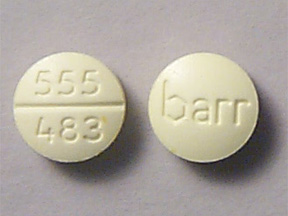
Amiloride-hydrochlorothiazide Coupons & Savings Card – Discount Prices from $32.95
Amiloride and hydrochlorothiazide is a medication combination used to manage high blood pressure (hypertension) and heart failure in adults. It consists of two types of diuretics: amiloride, a potassium-sparing diuretic, and hydrochlorothiazide, a thiazide diuretic. These medications help your body eliminate excess salt and water, which can increase urine production initially. Lowering blood pressure is crucial for reducing the risk of strokes, heart attacks, and kidney issues. Additionally, amiloride helps prevent or treat low levels of potassium in the blood. Typically, the medication is taken orally, once a day, with a common dosage being 1 or 2 tablets. The most frequently reported side effects include headache, dizziness, and reduced appetite. This combination is available as a generic medication, as the brand name Moduretic is no longer on the market. Always consult with your healthcare provider before starting any new medication.
Our coupons are free to use. Before paying, show the pharmacist your Amiloride-hydrochlorothiazide savings card to get your free discount. Use our filters below to edit the prescription box to match your needs. The Amiloride-hydrochlorothiazide prices will update based on your prescription needs. Above our Amiloride-hydrochlorothiazide coupons, you can change your location to see pharmacy prices and costs in other areas. We're here to help you buy Amiloride-hydrochlorothiazide at the lowest price with our prescription discount card.
My prescription
Edit
5-50MG, Amiloride-hydrochlorothiazide (90 Tablets)
Select pharmacy

CVS
$66.15
COUPON PRICE
Walgreens
$32.95
COUPON PRICE
Albertsons
$53.28
COUPON PRICE
Walmart
$58.26
COUPON PRICEAmiloride-hydrochlorothiazide savings card
Show this card to your pharmacist
Walgreens
$32.95
BIN
ID
PCN
GRP
015995
LHKPW331661
GDC
DR33
Powered by
Amiloride and hydrochlorothiazide is a medication combination used to manage high blood pressure (hypertension) and heart failure in adults. It consists of two types of diuretics: amiloride, a potassium-sparing diuretic, and hydrochlorothiazide, a thiazide diuretic. These medications help your body eliminate excess salt and water, which can increase urine production initially. Lowering blood pressure is crucial for reducing the risk of strokes, heart attacks, and kidney issues. Additionally, amiloride helps prevent or treat low levels of potassium in the blood. Typically, the medication is taken orally, once a day, with a common dosage being 1 or 2 tablets. The most frequently reported side effects include headache, dizziness, and reduced appetite. This combination is available as a generic medication, as the brand name Moduretic is no longer on the market. Always consult with your healthcare provider before starting any new medication.
Our coupons are free to use. Before paying, show the pharmacist your Amiloride-hydrochlorothiazide savings card to get your free discount. Use our filters below to edit the prescription box to match your needs. The Amiloride-hydrochlorothiazide prices will update based on your prescription needs. Above our Amiloride-hydrochlorothiazide coupons, you can change your location to see pharmacy prices and costs in other areas. We're here to help you buy Amiloride-hydrochlorothiazide at the lowest price with our prescription discount card.
More prescriptions for hypertension
coupons from$39.26Save 91%
coupons from$17.71Save 92%
coupons from$7.02Save 91%
coupons from$18.60Save 74%
coupons from$66.15Save 38%
coupons from$11.75Save 81%
coupons from$22.48Save 74%
coupons from$9.34Save 73%
More prescriptions for hypertension
Corgard Save 91%coupons from $39.26
Nifedipine ER Save 92%coupons from $17.71
Quinapril Save 91%coupons from $7.02
Spironolactone Save 74%coupons from $18.60
Acebutolol Save 38%coupons from $66.15
Benazepril-hydrochlorothiazide Save 81%coupons from $11.75
Enalapril-hydrochlorothiazide Save 74%coupons from $22.48
Amlodipine Save 73%coupons from $9.34
Amiloride-hydrochlorothiazide dosage forms
Use our Amiloride-hydrochlorothiazide 5-50MG coupon with prices from $54.77 for 90 Tablets. You can also use our Amiloride-hydrochlorothiazide 5-50MG coupon with prices from $15.08 for 30 Tablets. We have a Amiloride-hydrochlorothiazide 5-50MG coupon with prices from $27.88 for 45 Tablets. You can use our Amiloride-hydrochlorothiazide 5-50MG coupon with prices from $34.17 for 60 Tablets.
Dosage Quantity Price from Per unit 5-50MG 90 Tablets $54.77 $0.61 5-50MG 30 Tablets $15.08 $0.50 5-50MG 45 Tablets $27.88 $0.62 5-50MG 60 Tablets $34.17 $0.57 5-50MG 180 Tablets $94.55 $0.53
| Dosage | Quantity | Price from | Per unit |
|---|---|---|---|
| 5-50MG | 90 Tablets | $54.77 | $0.61 |
| 5-50MG | 30 Tablets | $15.08 | $0.50 |
| 5-50MG | 45 Tablets | $27.88 | $0.62 |
| 5-50MG | 60 Tablets | $34.17 | $0.57 |
| 5-50MG | 180 Tablets | $94.55 | $0.53 |
